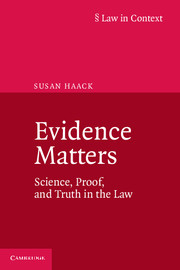Book contents
- Frontmatter
- Epigraph
- Contents
- Acknowledgments
- Introduction: A Pragmatist Perspective on Science, Proof, and Truth in the Law
- 1 Epistemology and the Law of Evidence
- 2 Epistemology Legalized
- 3 Legal Probabilism
- 4 Irreconcilable Differences? The Troubled Marriage of Science and Law
- 5 Trial and Error
- 6 Federal Philosophy of Science
- 7 Peer Review and Publication
- 8 What’s Wrong with Litigation-Driven Science?
- 9 Proving Causation
- 10 Correlation and Causation
- 11 Risky Business
- 12 Nothing Fancy
- Cases Cited
- Statutes, etc., Cited
- Bibliography
- Glossary
- Index
- References
4 - Irreconcilable Differences? The Troubled Marriage of Science and Law
Published online by Cambridge University Press: 05 August 2014
- Frontmatter
- Epigraph
- Contents
- Acknowledgments
- Introduction: A Pragmatist Perspective on Science, Proof, and Truth in the Law
- 1 Epistemology and the Law of Evidence
- 2 Epistemology Legalized
- 3 Legal Probabilism
- 4 Irreconcilable Differences? The Troubled Marriage of Science and Law
- 5 Trial and Error
- 6 Federal Philosophy of Science
- 7 Peer Review and Publication
- 8 What’s Wrong with Litigation-Driven Science?
- 9 Proving Causation
- 10 Correlation and Causation
- 11 Risky Business
- 12 Nothing Fancy
- Cases Cited
- Statutes, etc., Cited
- Bibliography
- Glossary
- Index
- References
Summary
In many respects [the scientific expert] seems to be a positive annoyance to lawyers, and even to judges at times, a sort of intractable, incompatible, inharmonious factor, disturbing the otherwise smooth current of legal procedure; too important or necessary to be ruled out, too intelligent and disciplined mentally to yield without reason to ordinary rules and regulations of the court, and at the same time possessing an undoubted influence with the jury that it is difficult to restrict by the established rules and maxims of legal procedure.
–Charles F. Himes
It is often said, with good cause, that … the goal of a trial and the goal of science are … at odds…. As a general rule, courts don’t do science very well.
–Edward HumesGETTING STARTED
There wasn’t much to be said for the miserable weeks after hurricanes Katrina and Wilma–except, perhaps, that all those hours spent sweating in the dark prompted some vivid thoughts about what life must have been like before electric light and power was available at the flick of a switch, and renewed my appreciation of the countless ways in which science now so thoroughly permeates modern life–including the legal system.
- Type
- Chapter
- Information
- Evidence MattersScience, Proof, and Truth in the Law, pp. 78 - 103Publisher: Cambridge University PressPrint publication year: 2014
References
- 2
- Cited by

